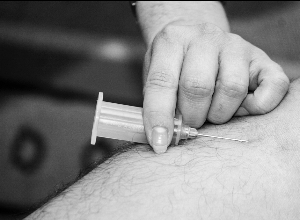What is the psychological impact of chronic pain? Carenity members share their experience!
Published May 29, 2021 • By Candice Salomé
Whatever its cause, with time, chronic pain can have an impact on a person's mental wellbeing, causing insomnia, depression, stress, anxiety, fatigue, social isolation and more. In order to evaluate the real impact of chronic pain, we launched a survey from April 28 to May 17, 2021 to which 597 members of our French, UK and American communities responded!
What is the impact of chronic pain on the everyday lives of Carenity members? What is the psychological impact of this pain? What do Carenity members do to alleviate it?
We tell you everything in our article!

When pain becomes chronic, it not only causes significant physical discomfort but also generates great mental suffering that can deepen over time. Thanks to our survey, we will be able to address the true impact that chronic pain has on the daily lives of Carenity members.
597 members responded to our survey in the United States, United Kingdom, and France
we launched a survey from April 28 to May 17, 2021 to which 597 members of the French, UK and American communities responded. We asked them questions about the impact of chronic pain on their daily lives.
The majority of respondents are between 41 and 60 years old (55%) and over 60 years old (26%).
They are affected by the following chronic illnesses:
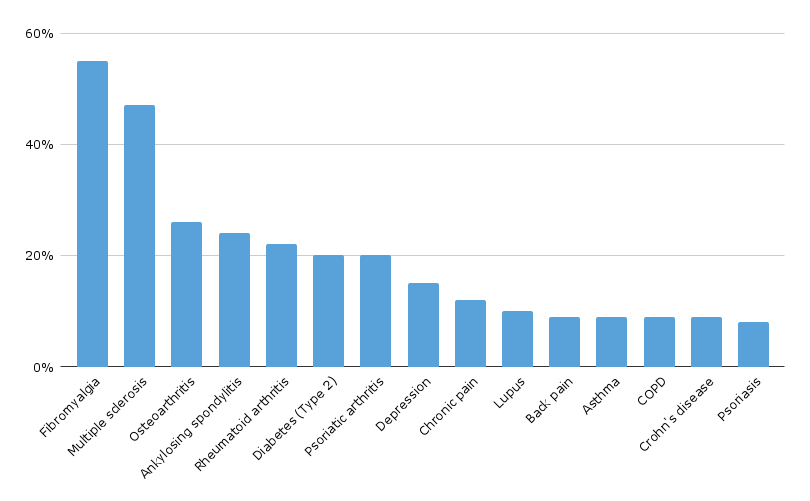
63% of the respondents are affected by a single health condition. Nevertheless, 15% of them are affected by two conditions and 9% by three.
79% of respondents experience pain on a daily basis
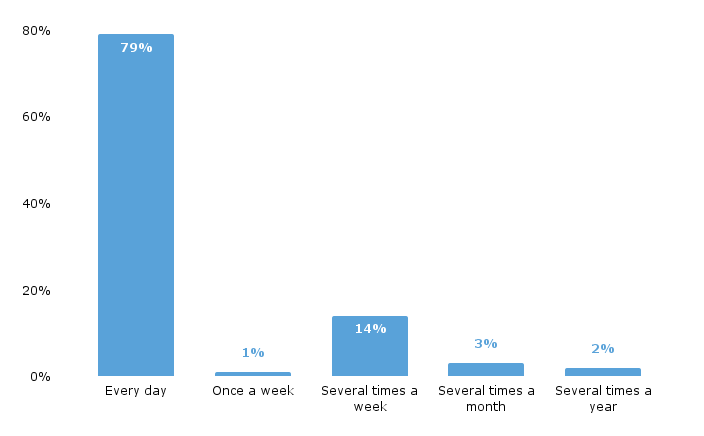
79% of respondents are affected by chronic pain on a daily basis while 14% are affected several times a week.
Chronic pain has a significant impact on Carenity members' daily lives
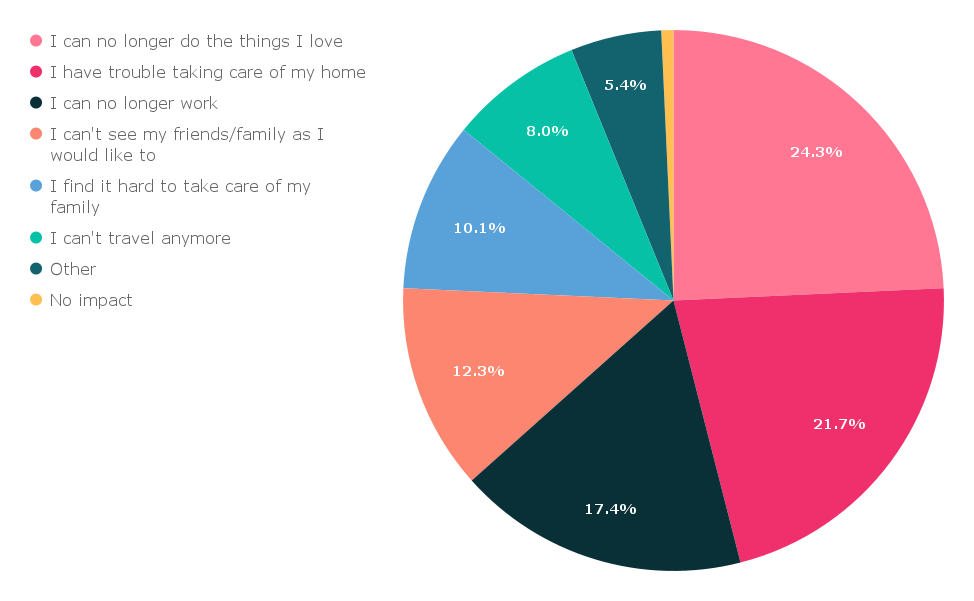
Chronic pain prevents 24% of members from doing the things they love. It also impacts members' ability to take care of their homes for 22% of respondents and 17% can no longer work because of it.
Chronic pain also has a major impact on respondents' mental well-being. For members, this pain causes:
 Anxiety (91%)
Anxiety (91%)
 Insomnia (60%)
Insomnia (60%)
 Fatigue (59%)
Fatigue (59%)
 Emotional stress (59%)
Emotional stress (59%)
 Withdrawal (social isolation) (46%)
Withdrawal (social isolation) (46%)
 Depression (45%)
Depression (45%)
 Low libido (42%)
Low libido (42%)
Members use various methods to alleviate their chronic pain
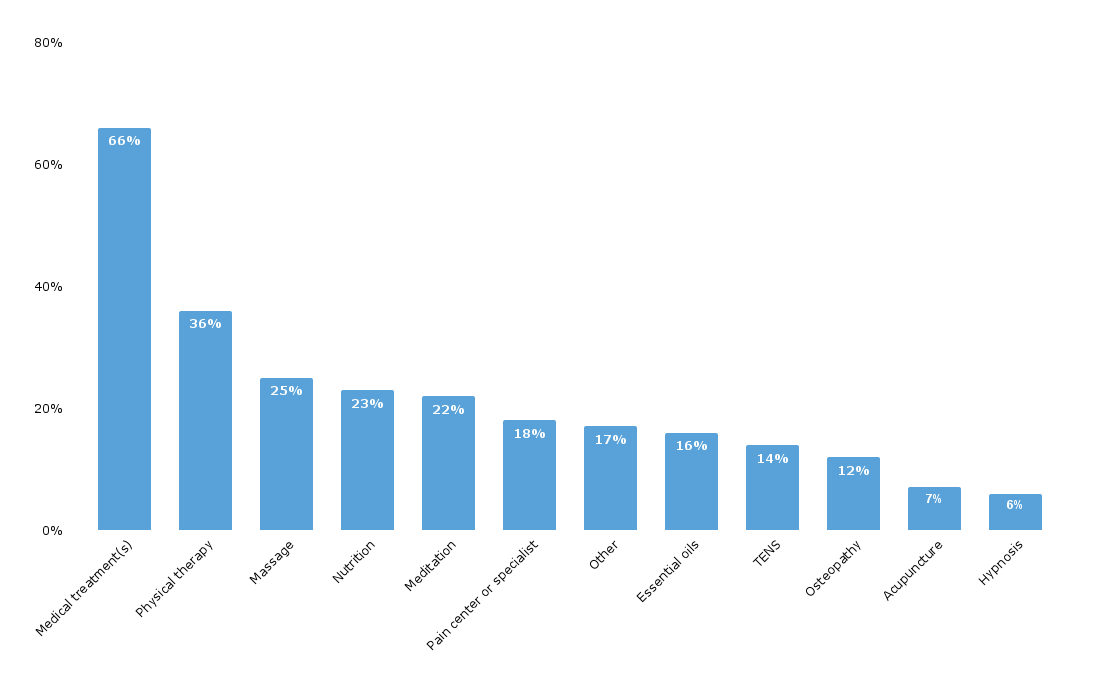
66% of respondents use pain medication to ease their chronic pain. Nevertheless, a large proportion use more natural methods: 25% use massage, 22% meditation, 16% essential oils, 7% acupuncture, and 6% hypnosis.
Of the members who answered "Other", they resort to: exercise and naturopathy.
Tips for living better with chronic pain in the day-to-day
The vast majority of pain has a physical origin. However, psychological factors can influence the perception of pain and, sometimes, the impairment associated with pain. Anxiety and depression can prevent patients from being able to control their symptoms and therefore from carrying out their occupations and activities.
Indeed, patients with chronic pain, knowing that the pain will come back may become anxious at the thought and thus anticipate its return. If these same patients can understand that a worsening of the pain does not necessarily indicate new lesions in their body, then they can be less anxious and therefore have less pain.
Here are some techniques to help you live better with chronic pain:
Meditation and mindfulness
Meditation and mindfulness have been found to be beneficial in reducing all types of pain. These practices help to manage stress, reduce the risk of depression, allow for better sleep and increase overall well-being.
>> You can find a 10-minute mindfulness meditation video to try at home here <<
Hypnosis
Hypnosis has many beneficial effects for the body and the mind. You can choose to consult a therapist or opt for self-hypnosis by training yourself via books, videos, or apps. The benefits are the same: hypnosis reduces pain, increases relaxation and sleep, and reduces emotional distress.
Anti-inflammatory foods
Depression and pain have been associated with high levels of inflammation in the body. If you choose a diet based on anti-inflammatory foods such as non-processed foods, fruits and vegetables, fatty fish, etc., chronic pain tends to decrease.
An adapted and progressive exercise program
We can sometimes be afraid of being active for fear of hurting ourselves. However, it is often the reduction of physical activity that leads to "abnormal" positions and contributes to increasing pain. In addition, during physical activity, the brain secretes endorphins that act on pain and improve sleep and mood. You should start very gradually to avoid injury by starting with 5 to 10 minutes every day.
Was this article helpful to you?
Share your thoughts and questions with the community in the comments below!
Take care!
Sources:
Carenity survey conducted from April 28 to May 17, 2021 on 597 members in France, the UK and the US.
- Facteurs psychologiques contribuant à la douleur, le Manuel MSD
- Impact psychologique de la douleur, Tous alliés contre la douleur
8 comments
You will also like

Spoon theory: What is it and how can it help people living with chronic illness?
Apr 13, 2022 • 7 comments

 Facebook
Facebook Twitter
Twitter




